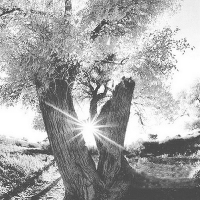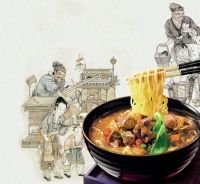二十年前,当《根》风靡美国的时候,它是被列在“非小说类畅销书”中的。1977年4月,美国国家书籍奖金委员会把历史特等奖授予了《根》,以表彰这部“非虚构的历史作品”。但是它二十年来在全世界的流传表明,读者们通常并不是把《根》当作一般意义的历史来阅读,他们更多的是沉浸在对《根》所描述的家族命运的关切之中,为它深刻的主题、活生生的形象和丰富的情感所打动。《根》更应该是一部文学作品,是一部优秀的历史小说。虽然作者信誓旦旦地说他怎样在尘封的故纸堆中寻找历史的线索、书中的人物怎样是他的爷娘祖奶奶,这些都并不重要,重要的是它的历史真实性是融合在它的艺术价值之中的。
因此《根》应该进入世界文学名著的行列。
强调《根》是文学作品,并不意味我们贬低它的历史含量和认识价值,恰恰相反,形象大于思想,正是它的艺术再现,使读者们更深刻地认识了美国黑人乃至美国的一段历史。
回顾美国文学,以最敏感的黑人问题为题材的作品已形成了一个专门的类别,据说其中是《汤姆大伯的小屋》、《飘》和《根》影响最大,最有代表性。其实,前两部作品还不能和《根》相比,完全以黑人的生活为主要情节且以黑人为主人公的作品,《根》是有开创意义的。尤其它的独特的叙述方式,“从头道来”,从“根”挖起,以一代一代黑人的命运,以他们的苦难和追求,雄辩地展示了主题,赋予了《根》以史诗的光辉。
《根》挖掘了一条美国黑人之根。这条根开始在1750年早春,西非冈比亚河上的嘉福村。这是作者所称由他上推七代的祖先降生之地,这条根也是所有美国黑人之根的代表和象征。请看康达·金特从出世到被白人奴贩即“土霸”掳掠去之前,那一段非洲部落的生活是多么淳朴和谐。那播种和丰收季节的歌舞与祈祷、篝火前的长老议事会、森林中的男子成年典礼……这一切都显示着他们人与人之间的关系是优雅自如的,是和谐的;而那晨雾荡漾的肯必·波隆河上,独木舟划破了平静的水面,惊醒了狒狒,惊散了野猪,林间百鸟鸣啭,河上苍鹭齐飞……这又是一个多么和谐的自然环境!人们常说应该以人与人的关系、人与自然的关系如何来检测一个民族的文明程度,应该看到,康达·金特的民族决不是野蛮的。野蛮的是把他们当猎物掳掠去的白人“土霸”。这个后来成为美国黑人的家族的苦难史就是从康达·金特被捕捉开始的,他们的非洲之根就从此处断了。
曾有人批评《根》所描绘的非洲生活情景过于理想化和浪漫化了,不够真实。这样的指摘其实还是一个历史小说中“历史”和“小说”之间关系的老问题。《根》不是功能学派的社会人类学考察报告,它的细节应该服从它的主题和更深刻的历史真实。当第一代黑奴在遥远的异乡受尽又孤苦无告时,那只能在梦中相见的故土自然也就显得和天堂一样美好。作者所写的是一个民族的象征的历史,那非洲的根已被注入了深层的含义,是终极追求的代称。
尽管已经有很多作品记录了美国黑人所遭受的苦难,但读一读《根》仍然会使我们的心为他们的苦难而震颤。从越洋运奴船上那些“土霸”们种种令人发指的暴行,到美国南方种植园里无穷无尽的苦役,黑人们是生活在血泪之中。读者不会忘记这样一个情节:在黑奴拍卖台上,一位黑人母亲当众摔死了自己亲生的婴儿,为的是“你们对我所做的一切,休想再做到我孩子身上”。白人们对她做了什么?不必细说我们就可以想象这位母亲所蒙受的必然比死亡还要惨烈可怕,以致他不惜摧毁女儿刚刚获得的生命,免得她再经历母亲的苦难。然而《根》更突出了美国黑人精神上所受的,那种失去了人的尊严而给心灵带来的痛苦。书中反复地指出:人最宝贵的东西,是知道自己是什么人,是从哪儿来的;而“土霸”们最恶毒之处就是不让黑人有自己的语言、自己的风俗,让他们不知道自己的“根”。因此,黑人们无法真正得到解放。用书中的话来说:“就是为白人工作一千年后,你还是黑奴。”没有了来历,没有了归属感,黑人们只能世世代代被卖来卖去,即使在废奴以后,也只能是茫然的漂泊者。“我漂泊,我徬徨,兰斯顿·休斯之语也正是代表了这种心态。《根》就是把这种归属感的寻求作为己任,在一个黑人家庭七代的历史中开辟艰苦的探访之路。
经过十二年的探索,作者终于找到了自己的“根”。他把这一过程写在了小说的最后部分,增加了此书的纪实色彩。他通过祖祖辈辈口耳相传的片言只语的非洲话,终于找到了冈比亚河畔祖先的村落,找到了他的黑奴第一代祖先康达·金特的来历。
掘到这条“根”是很了不起的,也使全书的主题完成了自己的乐章。受此鼓舞,事实上七十年代末许多美国黑人也掀起了一股寻根热潮。但是,是不是找到了自己祖先的村落也就真正找到了自己的尊严和价值了呢?恐怕不尽如此。美国的黑人问题是一个社会问题,而种族问题只是这个问题的标签。找到了种族意义上的根,并不等于找到了解决这个社会问题的根。割断黑人的民族传统,以蒙昧压制他们,并不是白人统治者肆虐的主要手段,至少不是唯一手段。即使到今天,即使在一些方面的境遇得到了不同程度的改善,即使寻到了根,美国黑人要想获得真正的平等、自由与解放,他们也还有许多事情要做。不过那是《根》以外的事情了。
其实《根》不仅挖掘了美国黑人之根,它也必然触及美国白人之根。
美国是白人统治的国家,黑人是以奴隶的身份被强制送到美洲大陆的。因此白人是主人。书中就描写了几位不同的主人:买下康达的约翰主人冷酷残暴,他的哥哥华勒主人“富有同情心而仁慈”,买下济茜的李主人下流无耻,是十足的人渣,墨瑞主人又似乎分外开通。然而所有这些主人--“好”主人和坏主人,都有一个共同处,那就是一切必须按照白人的规则行事,黑人永远只能听任宰割,在主人面前只能说“是”。在这个黑白分明的世界里,就白色主人整体而言,伪善和残暴只是对黑人交替使用的手段。对这一点,《根》揭露得很清楚。几个不同面目的白人主人其实都有这一根靠奴隶制度以自肥的根。
美国的白人来自何处?他们不用探寻也知道,来自欧洲。到“新大陆”来寻发财梦的人,大多数是走投无路而背井离乡。他们当中冒险家、受者、破产者和赌徒有的是。在美洲这块“充分自由”的土地上,他们的劣根性在对待有色人种时便不再受伦理道德乃至法律的约束而得以自由地表现。因为他们的意志就是法律,他们的欲望就是伦理。正如书中的黑人所说:“在他们成立一个新殖民地后,首先就盖一座法院,以通过更多的法律,然后再盖一间教堂来证明他们是徒。”鲁滨孙靠火枪和《圣经》征服了星期五,美国的白人征服者也是靠这两样役使他们的奴隶。当他们靠剥削黑人致富了,甚至当他们的孩子吃黑人奶妈的奶长大了,他们仍然没有忘记给黑人奴隶多加一条锁链。书中不止一次借鳄鱼和小男孩的故事叹道:这是一个思将仇报、弱肉强食的世界。白人对黑人是有太多的历史欠账,时至今日也没有真正解决的美国黑人问题就是蓄奴制和种族歧视的后果,也是美国的一条病根。
美国常常以“最、最自由、最讲”自诩,而《根》正是向世人揭示了最没有、最没有自由、最没有的黑人家族的历史,它的社会认识意义与《美国的悲剧》、《愤怒的葡萄》等美国文学史上的名篇是一致的。
《根》当然不是一部完美的作品,在它问世之初就有颇多争议。但是经过了二十年时间的冲刷,它没有淹没在无数过眼即逝的畅销书中,说明它具有名著的生命力。也正因为此,它值得我们进一步指出它的不足之处。
作者把主题建立在“寻到根就寻到一切”这一观念上,他希望黑人寻到根就寻到了尊严;白人寻到根就能了解和理解黑人;天下所有人都来寻根,就能相容相通。这只能是一个善良的愿望。我们尊重这个愿望,希望这个愿望能促进人类的和睦相处;但是从思想意义上说,与前人的作品相比,《根》的主题并没有本质的突破。所以书中的黑人们大多是在忍耐、顺从和对剧变的恐惧中度过一生。当他们得到自由,经营有成以后,自建的教堂、草地上野餐便成了他们莫大的快乐。
《根》在艺术上的成功显而易见。它塑造的人物各有特色,即使身份相似,性格也决不雷同。最为人难忘的自然是康达·金特和鸡仔乔治。前者的刚强坚毅、后者的聪明善良和乖巧浮浪莫不跃然纸上。几个白人主人也描写得栩栩如生不落俗套。尤其是华勒主人,他有教养。仁慈、宽容,作为医生四处救死扶伤,可是一旦他觉得自己的规矩被侵犯就立刻变得冷酷残忍。这个白人形象很有代表性。
作者是以写家史的心态来创作,因此这部作品没有小说传统的结构方式。它大体按照二百多年的时间顺序安排情节,详略得当,只是有关斗鸡的描写,虽然精彩但有些冲淡主题。它的叙事质朴自如,引人入胜。它以饱满的感情、丰富的想象力和优美细腻的笔触拨动读者的心弦,使我们读完这本书掩卷沉思之时,会想到更多的东西--关于“根”
艾柯
因此《根》应该进入世界文学名著的行列。
强调《根》是文学作品,并不意味我们贬低它的历史含量和认识价值,恰恰相反,形象大于思想,正是它的艺术再现,使读者们更深刻地认识了美国黑人乃至美国的一段历史。
回顾美国文学,以最敏感的黑人问题为题材的作品已形成了一个专门的类别,据说其中是《汤姆大伯的小屋》、《飘》和《根》影响最大,最有代表性。其实,前两部作品还不能和《根》相比,完全以黑人的生活为主要情节且以黑人为主人公的作品,《根》是有开创意义的。尤其它的独特的叙述方式,“从头道来”,从“根”挖起,以一代一代黑人的命运,以他们的苦难和追求,雄辩地展示了主题,赋予了《根》以史诗的光辉。
《根》挖掘了一条美国黑人之根。这条根开始在1750年早春,西非冈比亚河上的嘉福村。这是作者所称由他上推七代的祖先降生之地,这条根也是所有美国黑人之根的代表和象征。请看康达·金特从出世到被白人奴贩即“土霸”掳掠去之前,那一段非洲部落的生活是多么淳朴和谐。那播种和丰收季节的歌舞与祈祷、篝火前的长老议事会、森林中的男子成年典礼……这一切都显示着他们人与人之间的关系是优雅自如的,是和谐的;而那晨雾荡漾的肯必·波隆河上,独木舟划破了平静的水面,惊醒了狒狒,惊散了野猪,林间百鸟鸣啭,河上苍鹭齐飞……这又是一个多么和谐的自然环境!人们常说应该以人与人的关系、人与自然的关系如何来检测一个民族的文明程度,应该看到,康达·金特的民族决不是野蛮的。野蛮的是把他们当猎物掳掠去的白人“土霸”。这个后来成为美国黑人的家族的苦难史就是从康达·金特被捕捉开始的,他们的非洲之根就从此处断了。
曾有人批评《根》所描绘的非洲生活情景过于理想化和浪漫化了,不够真实。这样的指摘其实还是一个历史小说中“历史”和“小说”之间关系的老问题。《根》不是功能学派的社会人类学考察报告,它的细节应该服从它的主题和更深刻的历史真实。当第一代黑奴在遥远的异乡受尽又孤苦无告时,那只能在梦中相见的故土自然也就显得和天堂一样美好。作者所写的是一个民族的象征的历史,那非洲的根已被注入了深层的含义,是终极追求的代称。
尽管已经有很多作品记录了美国黑人所遭受的苦难,但读一读《根》仍然会使我们的心为他们的苦难而震颤。从越洋运奴船上那些“土霸”们种种令人发指的暴行,到美国南方种植园里无穷无尽的苦役,黑人们是生活在血泪之中。读者不会忘记这样一个情节:在黑奴拍卖台上,一位黑人母亲当众摔死了自己亲生的婴儿,为的是“你们对我所做的一切,休想再做到我孩子身上”。白人们对她做了什么?不必细说我们就可以想象这位母亲所蒙受的必然比死亡还要惨烈可怕,以致他不惜摧毁女儿刚刚获得的生命,免得她再经历母亲的苦难。然而《根》更突出了美国黑人精神上所受的,那种失去了人的尊严而给心灵带来的痛苦。书中反复地指出:人最宝贵的东西,是知道自己是什么人,是从哪儿来的;而“土霸”们最恶毒之处就是不让黑人有自己的语言、自己的风俗,让他们不知道自己的“根”。因此,黑人们无法真正得到解放。用书中的话来说:“就是为白人工作一千年后,你还是黑奴。”没有了来历,没有了归属感,黑人们只能世世代代被卖来卖去,即使在废奴以后,也只能是茫然的漂泊者。“我漂泊,我徬徨,兰斯顿·休斯之语也正是代表了这种心态。《根》就是把这种归属感的寻求作为己任,在一个黑人家庭七代的历史中开辟艰苦的探访之路。
经过十二年的探索,作者终于找到了自己的“根”。他把这一过程写在了小说的最后部分,增加了此书的纪实色彩。他通过祖祖辈辈口耳相传的片言只语的非洲话,终于找到了冈比亚河畔祖先的村落,找到了他的黑奴第一代祖先康达·金特的来历。
掘到这条“根”是很了不起的,也使全书的主题完成了自己的乐章。受此鼓舞,事实上七十年代末许多美国黑人也掀起了一股寻根热潮。但是,是不是找到了自己祖先的村落也就真正找到了自己的尊严和价值了呢?恐怕不尽如此。美国的黑人问题是一个社会问题,而种族问题只是这个问题的标签。找到了种族意义上的根,并不等于找到了解决这个社会问题的根。割断黑人的民族传统,以蒙昧压制他们,并不是白人统治者肆虐的主要手段,至少不是唯一手段。即使到今天,即使在一些方面的境遇得到了不同程度的改善,即使寻到了根,美国黑人要想获得真正的平等、自由与解放,他们也还有许多事情要做。不过那是《根》以外的事情了。
其实《根》不仅挖掘了美国黑人之根,它也必然触及美国白人之根。
美国是白人统治的国家,黑人是以奴隶的身份被强制送到美洲大陆的。因此白人是主人。书中就描写了几位不同的主人:买下康达的约翰主人冷酷残暴,他的哥哥华勒主人“富有同情心而仁慈”,买下济茜的李主人下流无耻,是十足的人渣,墨瑞主人又似乎分外开通。然而所有这些主人--“好”主人和坏主人,都有一个共同处,那就是一切必须按照白人的规则行事,黑人永远只能听任宰割,在主人面前只能说“是”。在这个黑白分明的世界里,就白色主人整体而言,伪善和残暴只是对黑人交替使用的手段。对这一点,《根》揭露得很清楚。几个不同面目的白人主人其实都有这一根靠奴隶制度以自肥的根。
美国的白人来自何处?他们不用探寻也知道,来自欧洲。到“新大陆”来寻发财梦的人,大多数是走投无路而背井离乡。他们当中冒险家、受者、破产者和赌徒有的是。在美洲这块“充分自由”的土地上,他们的劣根性在对待有色人种时便不再受伦理道德乃至法律的约束而得以自由地表现。因为他们的意志就是法律,他们的欲望就是伦理。正如书中的黑人所说:“在他们成立一个新殖民地后,首先就盖一座法院,以通过更多的法律,然后再盖一间教堂来证明他们是徒。”鲁滨孙靠火枪和《圣经》征服了星期五,美国的白人征服者也是靠这两样役使他们的奴隶。当他们靠剥削黑人致富了,甚至当他们的孩子吃黑人奶妈的奶长大了,他们仍然没有忘记给黑人奴隶多加一条锁链。书中不止一次借鳄鱼和小男孩的故事叹道:这是一个思将仇报、弱肉强食的世界。白人对黑人是有太多的历史欠账,时至今日也没有真正解决的美国黑人问题就是蓄奴制和种族歧视的后果,也是美国的一条病根。
美国常常以“最、最自由、最讲”自诩,而《根》正是向世人揭示了最没有、最没有自由、最没有的黑人家族的历史,它的社会认识意义与《美国的悲剧》、《愤怒的葡萄》等美国文学史上的名篇是一致的。
《根》当然不是一部完美的作品,在它问世之初就有颇多争议。但是经过了二十年时间的冲刷,它没有淹没在无数过眼即逝的畅销书中,说明它具有名著的生命力。也正因为此,它值得我们进一步指出它的不足之处。
作者把主题建立在“寻到根就寻到一切”这一观念上,他希望黑人寻到根就寻到了尊严;白人寻到根就能了解和理解黑人;天下所有人都来寻根,就能相容相通。这只能是一个善良的愿望。我们尊重这个愿望,希望这个愿望能促进人类的和睦相处;但是从思想意义上说,与前人的作品相比,《根》的主题并没有本质的突破。所以书中的黑人们大多是在忍耐、顺从和对剧变的恐惧中度过一生。当他们得到自由,经营有成以后,自建的教堂、草地上野餐便成了他们莫大的快乐。
《根》在艺术上的成功显而易见。它塑造的人物各有特色,即使身份相似,性格也决不雷同。最为人难忘的自然是康达·金特和鸡仔乔治。前者的刚强坚毅、后者的聪明善良和乖巧浮浪莫不跃然纸上。几个白人主人也描写得栩栩如生不落俗套。尤其是华勒主人,他有教养。仁慈、宽容,作为医生四处救死扶伤,可是一旦他觉得自己的规矩被侵犯就立刻变得冷酷残忍。这个白人形象很有代表性。
作者是以写家史的心态来创作,因此这部作品没有小说传统的结构方式。它大体按照二百多年的时间顺序安排情节,详略得当,只是有关斗鸡的描写,虽然精彩但有些冲淡主题。它的叙事质朴自如,引人入胜。它以饱满的感情、丰富的想象力和优美细腻的笔触拨动读者的心弦,使我们读完这本书掩卷沉思之时,会想到更多的东西--关于“根”
艾柯
一七五0年的早春,沿西非冈比亚河岸向上行需四天行程之处,有个叫做嘉福村的村落,村民欧玛若·金特的妻子嫔塔·金特刚临盆生下一个男孩。小家伙奋力从嫔塔硕健的体内挣脱出来便嚎啕大哭,皮肤和母亲一样黝黑,带着斑点的小身躯滑溜溜的,还有片片的血块。两位面容满布皱纹的接生婆,尼欧婆婆和婴儿的祖母爱莎,一看到是个男娃娃都开心地笑了。依据先祖的习俗说法,家中头胎男孩的到来预言阿拉神不仅会把特别的恩宠赐给父母,还会泽及父母亲的家族。因此,她们喜孜孜地知晓“金特”这个姓氏将会大放光彩,而且永垂后世。
鸡鸣破晓之前,屋内夹杂着这两位老妇人喋喋不休的聊天声,此娃儿所听到的第一个声音是屋外村妇用木杆舂谷所发出此起彼落的“嘭噗!嘭噗!”声。她们把瓦甑搭架在三块石头上,正在准备传统的早粥。
炊烟袅袅升起,飘过了村中的圆形茅草泥屋,弥漫空中,气味虽是呛鼻但仍令人感到愉悦。此时,村中的祭师——卡扬里·丹巴开始用他惯有的鼻音号叫,唤醒睡梦中的村民起来进行每日对阿拉神五次朝拜祈祷中的第一次早祷。村民于是仓促地跳离他们的竹床和兽皮棉被,并以最快的速度套上粗棉长袍,然后神采奕奕地奔向祈祷场。在那儿祭师会率领大家膜拜,口中念着:“伟大的神啊,我确证世上只有一位真神!”祈祷完毕,当村民正准备回家吃早餐时,欧玛若冲到人群里,眼中闪露出光芒,兴奋地向大家宣布喜获麟儿的大好消息。顿时,所有的村民都纷纷回应以各种大吉大利的贺喜话。
每个男人一回自己的茅屋后都会从妻子手中接过一碗粥,妻子会再回到厨房去喂小孩,然后才轮到自己吃。早饭后,男人们拎起木制把柄上已由村中铁匠嵌上铁路的弯柄短锄,然后动身前往田地工作,准备种植落花生、粗麦和棉花。那是男人的主要农作物,就如同在这热带,草木苍翠滋荣的国家冈比亚,种稻米是女人的主要工作一样。
依循古例,往后的七天,欧玛若必须很慎重其事地只专注于一件职务——为孩子命名。这个名字必须富有历史意义而且带有预言性,因为他的族人——曼丁喀族——深信孩子会从他所取名的人或事中承袭七种特性。
在七天的思索当中,欧玛若代表他自己和嫔塔拜访了嘉福村的家家户户,并邀请每个家庭前来参加此新生儿的命名典礼——传统上是在出生后的第八天。当天,这位新生儿会和父亲、祖父一样正式成为曼丁喀族的一分子。
第八天来临时,村民清早就聚集在欧玛若和嫔塔的茅屋前,双方家族的妇女头上都会顶着葫芦瓢,内盛庆典用的酸奶和揭米加蜂蜜做成的甜糕。村长卡拉莫·希拉背着咚咚鼓在那儿;祭师和小孩子将来的教师布里玛·西赛也在场。此外,欧玛若的两个兄弟——约尼和索罗——听到鼓声传来侄儿出生的消息也从老远赶来参加此典礼。
当嫔塔骄傲地抱着婴儿时,依惯例今天要剪去婴儿头上的一小撮头发。所有的妇女都惊叹他五官长得正。当村长开始击鼓时,大家就静肃无声,祭师对着酸奶和甜糕说了一段祷告词。在他祈祷时,每位客人都用右手触摸葫芦瓢的边缘,以示对食物的尊敬。然后祭师转身对婴儿祈祷,恳求阿拉神赐予长命百岁,将来能光宗耀祖,且为他的家、他的村及他的族带来子子孙孙,最后,并赐给他力量和精神,为他将要领受的名字带来荣誉。
欧玛若走到群聚的村民面前,从妻子手中接过小孩,并把他高举;在众目睽睽之下,他对着婴儿的耳朵喃喃轻喊三次他为他挑选的名字。这是婴儿的名字第一次被说出来,因为欧玛若的族人认为每个人都有权利第一个知道自己是谁。
此时咚咚鼓再度响起。欧玛若接着在嫔塔耳边轻喊了婴儿的名字,嫔塔骄傲且愉快地笑了;然后他对站在村民面前的教师布里玛·西赛轻喊了这个名字。
于是布里玛·西赛便大声呼喊:“欧玛若和嫔塔·金特的长子名叫做‘康达’!”
大家都知晓,那是婴儿已逝祖父卡拉巴·康达·金特的中间名宇。他祖父当初从祖国毛里塔尼亚来到冈比亚;在此,他拯救了嘉福村村民免受饥饿,娶了祖母爱莎,然后一生奉献给嘉福村直到他逝世。他被尊奉为圣人。
布里玛·西赛接着开始唱念婴儿的祖父——卡拉巴·康达·金特,以及那些毛里塔尼亚祖先的名字。这些既伟大且众多的名字,可追溯至两百多年前。此时村长敲击着他的咚咚鼓,所有的村民均对此卓越列祖列宗高喊出他们的赞赏和崇敬。
当晚,在皎月耀星之下,欧玛若单独陪伴他的儿子,完成了命名的仪式硕壮的手臂里抱着纤小的康达,他走到村落的边缘高举婴儿,使其面向上苍,柔和地说道:“看呀!这是唯一比自己更重要的东西!”
鸡鸣破晓之前,屋内夹杂着这两位老妇人喋喋不休的聊天声,此娃儿所听到的第一个声音是屋外村妇用木杆舂谷所发出此起彼落的“嘭噗!嘭噗!”声。她们把瓦甑搭架在三块石头上,正在准备传统的早粥。
炊烟袅袅升起,飘过了村中的圆形茅草泥屋,弥漫空中,气味虽是呛鼻但仍令人感到愉悦。此时,村中的祭师——卡扬里·丹巴开始用他惯有的鼻音号叫,唤醒睡梦中的村民起来进行每日对阿拉神五次朝拜祈祷中的第一次早祷。村民于是仓促地跳离他们的竹床和兽皮棉被,并以最快的速度套上粗棉长袍,然后神采奕奕地奔向祈祷场。在那儿祭师会率领大家膜拜,口中念着:“伟大的神啊,我确证世上只有一位真神!”祈祷完毕,当村民正准备回家吃早餐时,欧玛若冲到人群里,眼中闪露出光芒,兴奋地向大家宣布喜获麟儿的大好消息。顿时,所有的村民都纷纷回应以各种大吉大利的贺喜话。
每个男人一回自己的茅屋后都会从妻子手中接过一碗粥,妻子会再回到厨房去喂小孩,然后才轮到自己吃。早饭后,男人们拎起木制把柄上已由村中铁匠嵌上铁路的弯柄短锄,然后动身前往田地工作,准备种植落花生、粗麦和棉花。那是男人的主要农作物,就如同在这热带,草木苍翠滋荣的国家冈比亚,种稻米是女人的主要工作一样。
依循古例,往后的七天,欧玛若必须很慎重其事地只专注于一件职务——为孩子命名。这个名字必须富有历史意义而且带有预言性,因为他的族人——曼丁喀族——深信孩子会从他所取名的人或事中承袭七种特性。
在七天的思索当中,欧玛若代表他自己和嫔塔拜访了嘉福村的家家户户,并邀请每个家庭前来参加此新生儿的命名典礼——传统上是在出生后的第八天。当天,这位新生儿会和父亲、祖父一样正式成为曼丁喀族的一分子。
第八天来临时,村民清早就聚集在欧玛若和嫔塔的茅屋前,双方家族的妇女头上都会顶着葫芦瓢,内盛庆典用的酸奶和揭米加蜂蜜做成的甜糕。村长卡拉莫·希拉背着咚咚鼓在那儿;祭师和小孩子将来的教师布里玛·西赛也在场。此外,欧玛若的两个兄弟——约尼和索罗——听到鼓声传来侄儿出生的消息也从老远赶来参加此典礼。
当嫔塔骄傲地抱着婴儿时,依惯例今天要剪去婴儿头上的一小撮头发。所有的妇女都惊叹他五官长得正。当村长开始击鼓时,大家就静肃无声,祭师对着酸奶和甜糕说了一段祷告词。在他祈祷时,每位客人都用右手触摸葫芦瓢的边缘,以示对食物的尊敬。然后祭师转身对婴儿祈祷,恳求阿拉神赐予长命百岁,将来能光宗耀祖,且为他的家、他的村及他的族带来子子孙孙,最后,并赐给他力量和精神,为他将要领受的名字带来荣誉。
欧玛若走到群聚的村民面前,从妻子手中接过小孩,并把他高举;在众目睽睽之下,他对着婴儿的耳朵喃喃轻喊三次他为他挑选的名字。这是婴儿的名字第一次被说出来,因为欧玛若的族人认为每个人都有权利第一个知道自己是谁。
此时咚咚鼓再度响起。欧玛若接着在嫔塔耳边轻喊了婴儿的名字,嫔塔骄傲且愉快地笑了;然后他对站在村民面前的教师布里玛·西赛轻喊了这个名字。
于是布里玛·西赛便大声呼喊:“欧玛若和嫔塔·金特的长子名叫做‘康达’!”
大家都知晓,那是婴儿已逝祖父卡拉巴·康达·金特的中间名宇。他祖父当初从祖国毛里塔尼亚来到冈比亚;在此,他拯救了嘉福村村民免受饥饿,娶了祖母爱莎,然后一生奉献给嘉福村直到他逝世。他被尊奉为圣人。
布里玛·西赛接着开始唱念婴儿的祖父——卡拉巴·康达·金特,以及那些毛里塔尼亚祖先的名字。这些既伟大且众多的名字,可追溯至两百多年前。此时村长敲击着他的咚咚鼓,所有的村民均对此卓越列祖列宗高喊出他们的赞赏和崇敬。
当晚,在皎月耀星之下,欧玛若单独陪伴他的儿子,完成了命名的仪式硕壮的手臂里抱着纤小的康达,他走到村落的边缘高举婴儿,使其面向上苍,柔和地说道:“看呀!这是唯一比自己更重要的东西!”



